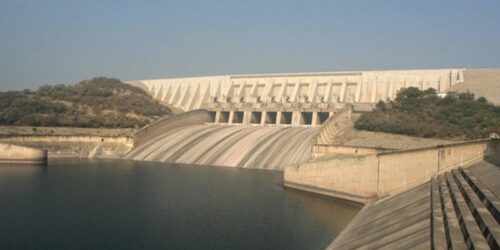LAHORE: The Mangla dam, the biggest water reservoir of the country, may not be filled this year, jeopardising 13 million acre feet (MAF) Rabi supplies to Punjab and endangering wheat crop in the province and food security of the country.
The Indus River System Authority (Irsa) now seems resigned to the fact, saying: “If the country has much above normal monsoon, the Mangla Lake may touch a level of 1,210 to 1,220 feet against its optimum level of 1,242 feet.”
The alarm bells started ringing when the lake, which should have gone much beyond 1,200 feet (80 percent of its capacity), by June 30, stood at 1,152 feet. According to the Irsa plan, Mangla Lake was supposed to [have filled] 1,216 feet, holding 5.6 million acre feet. Its actual position on July 1 was 1,153 feet, containing only 1.9maf water – a massive deficit of 3.7maf water.
“The Irsa was expecting 42maf water from April 1 to June 30,” says Iras spokesman Khalid Idrees Rana. “What it actually got is 35maf, with a deficit of 7maf or over 16pc loss. This loss was met with additional draw down of dams and Mangla became a victim. Additional water was also drawn from Tarbella, but Mangla, missing first deadline (June 30), could cause serious trouble. It looks to be a repeat of 2018 situation, when the lake level was 1,115 feet on June 30 and Irsa was able to ultimately fill it by 80pc. From current level, the lake would be totally dependent upon the monsoon and the only question now is how closer it gets to the optimum level, certainly without getting filled,” Rana says, adding “The Irsa would be supporting Mangla filling as soon as supplies improve on Indus arm. It would reduce releases from Mangla corresponding to the increase in Chenab and Indus – by transferring water though the link canals (CJ and TP).”
The Punjab, however, continues refusing to buy the Irsa argument and holds it responsible for, what it calls the current water mess. “When the river supplies started receding, Irsa, instead of passing the deficit on to the provinces, started emptying dams. It knew that Sindh was reporting grossly exaggerated water losses and Irsa itself was disputing those loss figures. However, it still provided additional 2.5maf water to Sindh because of those notional figures and did so at the cost of Mangla filling. Why rue it now? This deficit would now threaten Pakistan’s food security next Rabi and Irsa will be held responsible for it,” says an official of the Punjab Irrigation Department.
“On a positive note, river supplies have started improving,” an optimistic Rana explains. In the last 24 hours alone, the supplies have jumped by 20,000 cusecs – from 240,000 cusecs on Wednesday to 260,000 cusecs on Thursday. Temperatures are rising in Indus catchment, which is a good sign: on Thursday, mercury in Skardu touched 31.7 degrees Celsius and even minimum was 20 degrees Celsius, which is more important. If the minimum temperatures drop below 15 degrees Celsius, night melting stops. If the temperature holds, national supplies should improve substantially and bring relief to everyone. Irsa cannot draw more than 131,000 cusecs right now because Tunnel 3 and 4 cannot be operated due to low water level. In the next 2-3 days, level of Tarbella should allow drawing of 155,000 cusecs and bring national relief,” he concludes.





